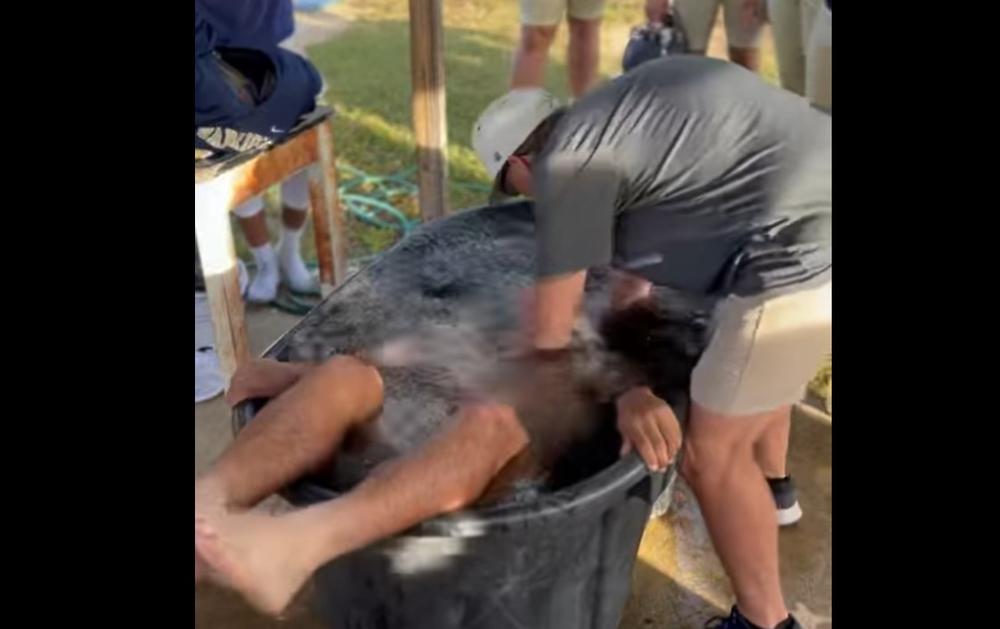
Caption
A video posted to Facebook shows one of several students at Tattnall County High School getting baptized after practice on October 23, 2023.
Credit: Facebook
LISTEN: Chris Line, an attorney with the Freedom From Religion Foundation, calls the baptism of Tattnall County High School football players “religious coercion.” GPB's Peter Biello speaks with him.

A video posted to Facebook shows one of several students at Tattnall County High School getting baptized after practice on October 23, 2023.
After a practice last month, about 20 members of a high school football team in southeast Georgia were baptized. The video posted on the Tattnall County Football Facebook page shows the young men one after the other, being dunked underwater.
The school system declined to talk to GPB about what happened, citing an ongoing investigation, but did say that coach Isaac Farrell won't be coach next year because of a separate incident on Friday, Nov. 3 after a football game which it describes as a "personnel matter."
Chris Line, an attorney with the Freedom from Religion Foundation, wants the school to stop this kind of behavior, which he calls "religious coercion." He spoke with GPB's Peter Biello.
Peter Biello: The video posted to the official Tattnall County football page says coach Isaac Farrell, quote, "gave the guys the opportunity" to be baptized. You and your organization have called this religious coercion. Why? What makes it coercion?
Chris Line: The issue is that this is obviously taking place as a part of his official duties as a public school football coach. The only reason why he's able to give this opportunity and the only reason why they're gathered there is that they just had football practice. So this is a public school football coach with this public school football team at the practice field — and it sounds like it was immediately following practice; it was described to us as part of practice, which, you know, obviously it's hard to kind of distinguish that, but it clearly is within his capacity as a coach. And that's really what makes this very clearly unconstitutional.
Peter Biello: I want to get into a little more about why you think it's unconstitutional in a minute, but please do tell me a little more about the coercion. ... Why "coercion"?
Chris Line: Student athletes in particular, more even so than just students, are especially susceptible to coercion. You know, coaches control their playing time, positions, you know, which can then affect their ability to get college scholarships and be recruited if that's a road that these athletes want to go down. So if there's a team event going on, players are going to want to be a part of it. They can't really say no, even if they're not religious and they don't want to be a part of this. And even if they maybe didn't get baptized themselves, they might have felt pressured to at least stay for the event because this is a team event going on. You know, these players are being baptized. Clearly it's something that the coach wants. So anyone who's participating is going to be possibly seen in a favorable light for this coach.
Peter Biello: Can you tell us a little bit more about why it's unconstitutional? What's the legal precedent for that?
Chris Line: Basically, there's a long history of court cases that sort of set up the fact that student athletes have the First Amendment right to be free from religious indoctrination as a part of participating in a school athletic program. You know, there's a lot of cases which basically says that it's illegal for public school athletic coaches to invite or instruct others, such as pastors, to lead the team in prayer, religious activity, proselytizing, baptism. The Supreme Court has regularly and continuously struck down school-sponsored religious activities in public schools. The big case kind of connected to football took place in 2000. That was Santa Fe Independent School District v. Doe. Now, in that case, they found that even student-led prayer over the loudspeaker before football games was unconstitutional.
Peter Biello: And are you able to sue? Do you have standing? Or would you need one of the young men who was involved to bring a suit?
Chris Line: In order to bring a suit, we would need a parent of one of the students who is involved, the student themselves, something like that. For whatever reason, either students don't come forward to us or they're, like we said, there's this coercion thing. So we're already talking about the fact that a student doesn't feel comfortable not participating. Well, imagine the pressure and the backlash that there could be if one of these students not only voice their right to not have to engage in this kind of activity, but actually trying to take legal action against their coach and their school. We're always hopeful that — that someone will come forward and we can look into that. We're always reaching out and hoping that people will come forward so that we can help stop these incidences from happening.